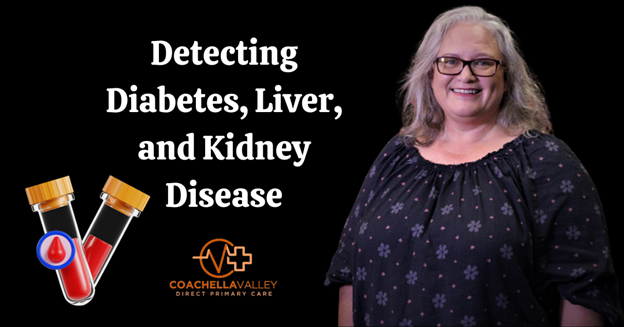Imagine stepping into a world where your health is not just a number on a chart but a fully mapped journey, personalized and tailored specifically to you. Welcome to the era of Coachella Valley Direct Primary Care. We’ve moved beyond the era of lingering in waiting areas and experiencing hurried consultations. We’re diving into a groundbreaking shift that’s changing the game entirely.
The concept might seem futuristic at first glance. But it’s happening right now in Coachella Valley. Imagine having healthcare that feels less like a system and more like an ally in your quest for wellness. It’s not every day you hear about innovations that could redefine how we view medical care, especially ones rooted so deeply in community values.
This isn’t just another service; it’s changing lives by offering what many thought was lost: time with their doctors and genuine care without barriers or bureaucracy.
Coachella Valley Direct Primary Care
Frustration-free health care for the whole family. A monthly membership program designed for the busy Coachella Valley family to give you direct access to primary healthcare services so you can be healthy and active. Schedule a free consultation. 760-642-5549
Table Of Contents:
- Understanding the Comprehensive Metabolic Panel
- The Process of Getting a Metabolic Panel Test
- Key Components of a Comprehensive Metabolic Panel
- The Role of Electrolytes and Fluid Levels in Your Health
- Understanding Abnormal Results and Next Steps
- Advances in Metabolic Panel Testing: A Game-Changer for Your Health
- Conclusion
Understanding the Comprehensive Metabolic Panel
Ever wondered what a comprehensive metabolic panel (CMP) is and why your doctor orders it? Let’s break it down.
Have you ever been curious about what exactly a Comprehensive Metabolic Panel entails?
A CMP isn’t just any blood test. It’s like getting an insider’s look at how your body’s organs are performing. Imagine it as your body’s control panel, offering up data ranging from glucose quantities to hepatic performance. MedlinePlus explains that this panel tests for 14 different substances in your blood, offering clues about your overall health.
Importance in Health Monitoring
Catching something early can make all the difference. That’s where the CMP comes in handy. It helps spot trouble before symptoms show up, letting doctors tackle issues head-on. This examination is your go-to for monitoring long-term ailments or verifying the effectiveness of medical interventions.

Detecting Diabetes, Liver, and Kidney Disease
- Diabetes: Through glucose levels, the CMP shows if your blood sugar is too high or low.
- Liver disease: Tests like alkaline phosphatase give us hints about liver health.
- Kidney disease: The presence of waste products such as urea nitrogen tells us how well kidneys filter out toxins.
We often think of these diseases only when symptoms get serious, but knowing them early can be life-changing. The National Library of Medicine states that regular monitoring through a CMP provides valuable insights into managing these conditions effectively. So next time you see “CMP” on your lab sheet, remember that knowledge is power—especially when it comes to our health.
The Process of Getting a Metabolic Panel Test
Ever wondered what goes into getting that comprehensive metabolic panel test your doctor keeps talking about?
Preparing for Your Test
Fasting is the game here. But why? Well, to get those accurate results we all need. You’ll have to play by the rules and avoid eating or drinking anything (except water) for at least eight hours before your blood draw. It sounds tough but think of it as giving your body a little rest before its big performance.
- Avoid food and drinks except water for eight hours prior.
- Skip that morning coffee until after the test – even black coffee can affect results.
- Tell your doctor about any meds you’re on; some might need a pause button, too.
During the Test
So what happens during this infamous blood draw? It’s quick—less than ten minutes. A small needle gets inserted into one of your veins (usually in the arm), and a bit of blood is collected in tubes. And hey, if needles make you queasy, let them know. They’re equipped with some neat strategies to ease any discomfort you might have.
Understanding Your Results
Have you got back those numbers and feel like you’re reading an ancient script? Each part of that CMP has its tale to tell—from how well those kidneys are filtering out waste products like urea nitrogen to whether or not your liver’s having a party without inviting you through enzymes like alanine transaminase.Your healthcare provider should be able to walk through each component with you, but knowing the basics can turn ‘Huh?’ into ‘Aha.’ moments real fast:
That said, remember: these numbers don’t define health alone, but they sure give us vital clues about where we stand, so take them seriously.
Key Takeaway:
Fasting is key for accurate metabolic panel results, so skip breakfast and that morning coffee. A quick blood draw then gives you insights into your health, from liver function to diabetes risk. Remember, these numbers are clues, not definitions of health.
Key Components of a Comprehensive Metabolic Panel
A comprehensive metabolic panel (CMP) is like your body’s report card. It tells you how well your organs are doing their jobs and flags anything that might be off. Peering closely, we uncover the intricate components that form the backbone of this vital examination.
Assessing Kidney Function Through Waste Products
Your kidneys are like the unsung heroes in the world of waste management. They filter out stuff your body doesn’t need, turning it into urine. Two key players in checking if they’re on top of their game? Urea nitrogen and creatinine levels.
- Urea Nitrogen: This waste product comes from breaking down protein. Too much hanging around in your blood? It might be a sign those kidney filters aren’t working right.
- Creatinine: This guy’s a by-product of muscle metabolism. High levels can mean your kidneys are struggling to keep up with clearing out waste.
Liver Function Tests Explained
The liver’s got its hands full – detoxifying chemicals, metabolizing drugs, making proteins for blood clotting…you name it. So, how do we check if it’s all smooth sailing there?
- Alkaline Phosphatase (ALP): A high score here could hint at blockages or issues with bile flow—basically liver traffic jams.
- Aspartate Aminotransferase (AST) & Alanine Aminotransferase (ALT): Sounding more like secret agents than enzymes, these guys go up when liver cells take damage—a heads-up something’s not right.
The Role of Electrolytes and Fluid Levels in Your Health

Ever wonder what keeps your body’s engine running smoothly like a well-oiled machine? It’s not just about the fuel you put in. Let me introduce you to the unsung heroes: electrolytes and fluid levels.
Why Electrolyte Balance is a Big Deal
You’ve heard of them—sodium, potassium, all those ions dancing around in your waterworks. But why should you care? Because they’re essentially your body’s spark plugs. Without them firing right, things can go haywire really quickly.
- Sodium: Think of it as the boss of water balance and nerve function. Too much or too little can lead to some serious health hiccups.
- Potassium: This guy helps with muscle contractions (including that big muscle called your heart) and nerve signals.
- Magnesium: Critical for energy production, muscle movements, and even keeping anxiety at bay.
We need these minerals in the right amounts to keep our engines purring without any sputters or stalls. The National Library of Medicine breaks down how each one plays its part beautifully.
Finding That Sweet Spot with Fluid Levels
Your body is mostly water—imagine that. Ensuring your body retains the right amount of water is not merely a suggestion; it’s vital for keeping you alive. We’re talking about transporting nutrients, flushing out waste products filtered by our kidneys (those tiny but mighty organs), maintaining blood pressure, and so on.
- A tad more hydrated boosts brain power—a win-win if you ask me.
- Lack thereof leads to fatigue because when there’s less volume coursing through those veins—the heart works overtime trying to compensate.
The gist here? Balancing fluids is akin to fine-tuning a race car before hitting the track—it makes everything run smoother. MedlinePlus offers insight into this delicate dance we call hydration balance.
Key Takeaway:
Electrolytes and fluid levels are your body’s unsung heroes, keeping everything running smoothly. They’re crucial for muscle function, nerve signals, and overall health. Stay hydrated to boost brain power and avoid fatigue.
Understanding Abnormal Results and Next Steps
So, your comprehensive metabolic panel came back, and the results are… drumroll please… abnormal. Before you hit the panic button or start Googling what could possibly be wrong (because, let’s face it, that never ends well), let’s chat about what those abnormal levels really mean and how to move forward.
What Do Abnormal Levels Mean?
An abnormal result doesn’t automatically signal a dire situation. Think of it as your body whispering (or maybe shouting) that something’s up. A spectrum of possibilities exists, from the simplicity of needing more water to the complexity of managing diabetes, liver disorders, or renal complications. But here’s the thing: context is king. Your healthcare provider will consider these results alongside other factors like symptoms, medical history, and even medications you’re currently taking.
Talking with Your Healthcare Provider
The next step? Schedule a sit-down with your doctor. And when I say talk, I don’t mean just nodding along while they throw around big words like “aspartate aminotransferase” or “blood urea nitrogen.” Ask questions until you get answers that make sense to you.
- Come Prepared: Bring notes on any symptoms you’ve been experiencing and all meds or supplements you take.
- No Question Is Too Small: From diet changes to medication adjustments – ask away.
- Possible Follow-Ups: Be ready for potential additional tests – this isn’t always a one-and-done deal.
The Bottom Line…
Finding abnormalities in your blood work can feel unsettling, but remember—it’s a starting point for getting deeper insights into your health status rather than an end diagnosis. With open communication with your healthcare provider and perhaps some further investigation if needed, you’ll be well-equipped to tackle whatever comes next because knowledge, after all, is power—or at least peace of mind.
Key Takeaway:
Do you have weird numbers on your metabolic panel? Don’t freak out. Abnormal results don’t always mean bad news but do signal it’s time to chat with your doctor. Understand what these levels indicate, ask questions, and be ready for more tests if needed. Remember, knowledge is both power and peace of mind.
Advances in Metabolic Panel Testing: A Game-Changer for Your Health
Let’s talk about something that’s revolutionizing the way we approach our health. Yes, I’m talking about the leaps and bounds being made in metabolic panel testing. This isn’t your grandma’s blood test; it’s a whole new ball game.
Why It Matters More Than Ever
In an era where personal health is taking center stage, understanding what’s going on inside your body has never been more crucial. Think of comprehensive metabolic panels (CMPs) as your body’s monthly performance report. They’re not just numbers on a page but insights into how well your organs are partying together – or if they’re stepping on each other’s toes.
The New Kids on the Block: Enhanced Tests
Gone are the days when getting a CMP meant waiting anxiously for results that only scratched the surface. Today, advanced metabolic tests dive deeper than ever before into understanding our bodies’ complex chemistry.
- Blood Urea Nitrogen (BUN): A closer look at kidney function by measuring waste product levels.
- Liver Enzymes: Zeroing in on liver health with pinpoint accuracy to catch issues early.
- Sugar Levels: Because keeping tabs on blood sugar is vital for dodging diabetes down the line.
This means earlier detection of potential problems and more personalized healthcare plans. It’s like having a tailored suit rather than grabbing one off the rack—it just fits better.
Tech Meets Test: The Role of AI and At-Home Kits
We’ve seen tech transform industries across the board, and healthcare is no exception. Enter AI-driven analysis and at-home testing kits—these innovations have taken metabolic panel tests from strictly clinic-bound to anywhere you are accessible. The best part? You get clearer insights faster than you can say “comprehensive metabolic panel” three times fast. Studies show that integrating AI reduces error margins significantly while making sense of complex data sets quicker than humanly possible.
Let’s not overlook at-home kits; they’ve turned what used to be an ordeal into DIY simplicity without sacrificing accuracy.
So yes, my friends, advances in metabolic panel testing aren’t just happening—they’re reshaping how we interact with our own health narrative.
Key Takeaway:
Metabolic panel testing has evolved, offering deeper insights into our health with the help of advanced tests and tech like AI and at-home kits. It’s not just a check-up; it’s personalized healthcare that fits you perfectly.
Conclusion
Embarking on this exploration of Coachella Valley’s Direct Primary Care has been like uncovering a hidden gem in healthcare, showcasing a revolutionary wave that reshapes how we perceive patient treatment. This isn’t just another fleeting trend; it’s a monumental shift towards what many believed was out of reach: personalized care, where patients are seen as individuals rather than numbers.
We debunked myths and uncovered truths about a system designed with you at its core. It’s clear now more than ever that healthcare can be more human, accessible, and tailored to fit into our lives seamlessly. We’re not talking about distant futures or hypotheticals; this is happening right here in Coachella Valley.
The takeaway? A future where doctors are allies, appointments aren’t rushed, and your health journey is exactly that—yours—isn’t just possible; it’s unfolding before our eyes. And while Hollywood spins tales of dystopia and technology gone awry, remember the real story being written in places like Coachella Valley—a narrative of hope, innovation, and genuine care.

